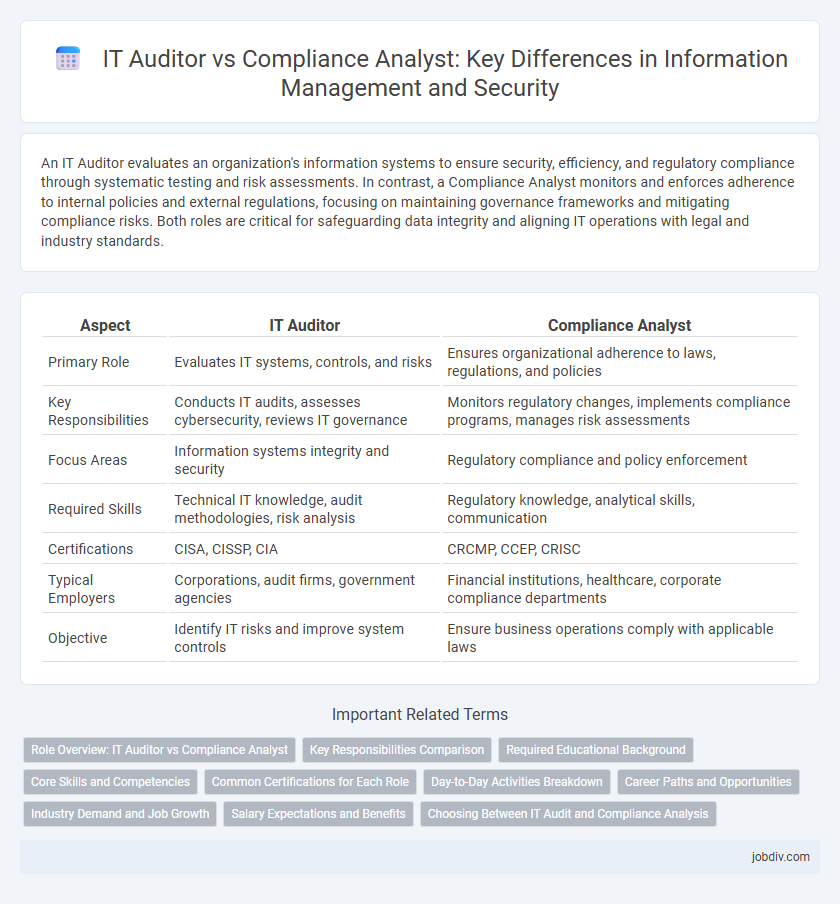An IT Auditor evaluates an organization's information systems to ensure security, efficiency, and regulatory compliance through systematic testing and risk assessments. In contrast, a Compliance Analyst monitors and enforces adherence to internal policies and external regulations, focusing on maintaining governance frameworks and mitigating compliance risks. Both roles are critical for safeguarding data integrity and aligning IT operations with legal and industry standards.
Table of Comparison
| Aspect | IT Auditor | Compliance Analyst |
|---|---|---|
| Primary Role | Evaluates IT systems, controls, and risks | Ensures organizational adherence to laws, regulations, and policies |
| Key Responsibilities | Conducts IT audits, assesses cybersecurity, reviews IT governance | Monitors regulatory changes, implements compliance programs, manages risk assessments |
| Focus Areas | Information systems integrity and security | Regulatory compliance and policy enforcement |
| Required Skills | Technical IT knowledge, audit methodologies, risk analysis | Regulatory knowledge, analytical skills, communication |
| Certifications | CISA, CISSP, CIA | CRCMP, CCEP, CRISC |
| Typical Employers | Corporations, audit firms, government agencies | Financial institutions, healthcare, corporate compliance departments |
| Objective | Identify IT risks and improve system controls | Ensure business operations comply with applicable laws |
Role Overview: IT Auditor vs Compliance Analyst
IT Auditors evaluate an organization's information systems, ensuring accuracy, security, and regulatory compliance through systematic audits and risk assessments. Compliance Analysts specialize in monitoring and enforcing adherence to external regulations and internal policies, focusing on identifying non-compliance issues and recommending corrective actions. Both roles safeguard organizational integrity but IT Auditors emphasize technical control assessments while Compliance Analysts concentrate on policy enforcement and regulatory alignment.
Key Responsibilities Comparison
IT Auditors primarily evaluate an organization's IT infrastructure and controls to ensure data integrity, security, and regulatory compliance, conducting systematic risk assessments and audits. Compliance Analysts focus on monitoring and enforcing adherence to industry regulations, internal policies, and legal standards to mitigate compliance risks and ensure operational consistency. Both roles involve risk management and compliance, but IT Auditors emphasize technical system audits, while Compliance Analysts concentrate on regulatory frameworks and policy enforcement.
Required Educational Background
IT Auditors typically hold a bachelor's degree in information technology, computer science, or cybersecurity, with many pursuing certifications such as CISA (Certified Information Systems Auditor) to enhance their credentials. Compliance Analysts often have educational backgrounds in business administration, law, or finance, complemented by certifications like CRCM (Certified Regulatory Compliance Manager) or CIS (Certified Information Systems Security Professional) to ensure thorough understanding of regulatory requirements. Both roles emphasize continuous education and industry-specific training to stay updated with evolving standards and technologies.
Core Skills and Competencies
IT Auditors excel in risk assessment, IT controls evaluation, and vulnerability testing, ensuring regulatory compliance and secure information systems. Compliance Analysts specialize in regulatory frameworks, policy development, and internal audits to enforce organizational adherence to legal standards. Both roles require strong analytical skills, attention to detail, and proficiency in industry-specific software and standards.
Common Certifications for Each Role
IT Auditors commonly hold certifications such as Certified Information Systems Auditor (CISA), Certified Internal Auditor (CIA), and Certified Information Security Manager (CISM), which validate their expertise in auditing information systems and managing IT risks. Compliance Analysts often pursue Certified Compliance and Ethics Professional (CCEP), Certified Information Privacy Professional (CIPP), and Certified Regulatory Compliance Manager (CRCM) credentials to demonstrate their proficiency in regulatory requirements and compliance frameworks. Both roles benefit from industry-recognized certifications that enhance their ability to assess risks, enforce policies, and ensure organizational adherence to legal standards.
Day-to-Day Activities Breakdown
IT Auditors primarily focus on evaluating the effectiveness of an organization's IT systems, conducting risk assessments, and performing security audits to ensure compliance with regulatory standards. Compliance Analysts monitor ongoing adherence to policies, review regulatory changes, and prepare detailed reports for management to maintain industry certifications. Both roles require collaboration with internal teams, but IT Auditors emphasize technical controls while Compliance Analysts concentrate on policy enforcement.
Career Paths and Opportunities
IT Auditors specialize in evaluating an organization's IT infrastructure, risk management, and control effectiveness, often progressing into senior audit roles or IT governance leadership positions. Compliance Analysts focus on ensuring adherence to regulatory requirements across industries, with career growth leading to compliance management or risk advisory roles. Both career paths offer opportunities in sectors such as finance, healthcare, and government, emphasizing continuous skill development in cybersecurity and regulatory frameworks.
Industry Demand and Job Growth
The IT Auditor and Compliance Analyst roles are experiencing strong industry demand due to increasing regulatory requirements and cybersecurity concerns across sectors such as finance, healthcare, and technology. Job growth for IT Auditors is projected at 10% over the next decade, fueled by the need for robust risk assessment and IT control evaluations in complex systems. Compliance Analysts see a similar growth rate, driven by expanding compliance frameworks and heightened scrutiny of data privacy laws worldwide.
Salary Expectations and Benefits
IT Auditors typically command higher salary expectations, averaging between $75,000 and $105,000 annually due to their specialized skills in evaluating IT systems and security controls. Compliance Analysts earn between $60,000 and $90,000, reflecting their focus on regulatory adherence and risk management within organizations. Both roles often include benefits such as health insurance, retirement plans, and opportunities for professional certifications that enhance career growth.
Choosing Between IT Audit and Compliance Analysis
Choosing between an IT Auditor and a Compliance Analyst depends on your interest in evaluating IT systems versus ensuring regulatory adherence. IT Auditors focus on assessing the security, efficiency, and controls of information technology infrastructure, while Compliance Analysts concentrate on monitoring and enforcing organizational policies to meet legal and industry standards. Career growth potential varies, with IT Audit roles often demanding technical expertise and certifications like CISA, whereas Compliance Analysis prioritizes knowledge of regulations such as GDPR and HIPAA.
IT Auditor vs Compliance Analyst Infographic

 jobdiv.com
jobdiv.com